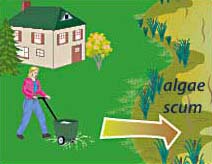Nitrogen as an ecological function
What is nitrogen?

Why is nitrogen important?
Nitrogen is the biological limiting nutrient in marine systems, generally by being the least available for marine plants and algae. It is similar to phosphorus in freshwater in that when there is too much or too little it can change how an ecosystem functions.
What affects the movement or amount of nitrogen?
Altering wetlands and headwater streams through channelizing or filling can affect the movement of nitrogen.
Nitrogen moves through the watershed in these key areas:
- depressional wetlands
- headwater streams, and
- soil erosion.
Nitrogen can be increased through:
- leakage of septic systems;
- agricultural and residential impacts such as the application of manure and fertilizers or poor manure management; and
- clearing areas without soil stabilization or without replanting native species. (Some non-native invasive species can increase the amount of nitrogen along shorelines.)
References: Stanley et al 2005; and Schlesinger 1997 (Acrobat pdf files).
Shoreline videos: Life on the Edge
Related information
- Animals, plants and habitat
- Lake services and information
- Environmental monitoring data
- Puget Sound marine information

 Translate
Translate